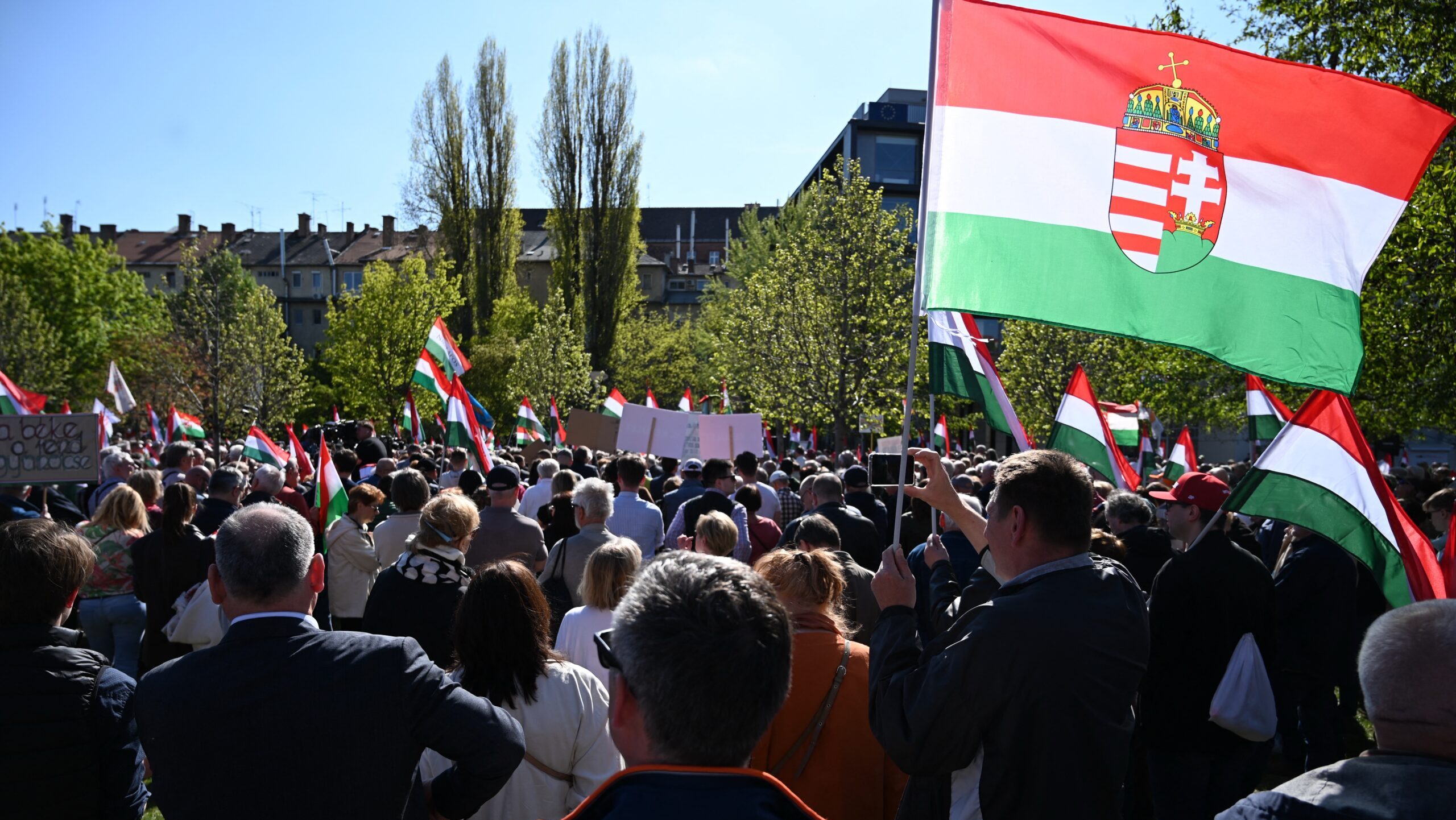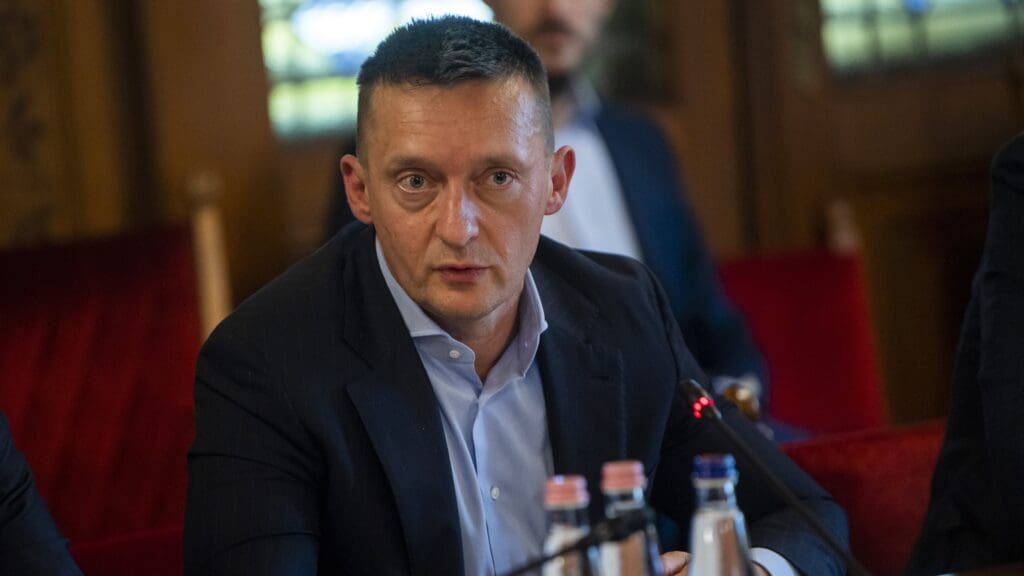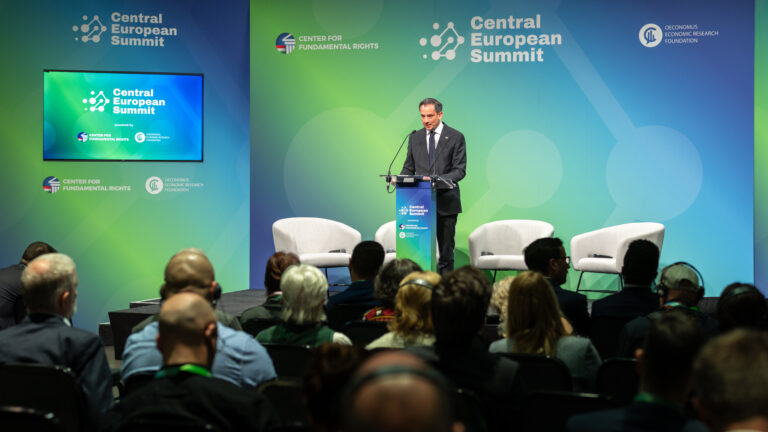Hungarian democracy and public discoure hasn’t seen such an intense weekend in a long time as the one we’ve just had. On 12–13 April, several protests—both opposition and pro-government—were held in the Hungarian capital, Budapest, painting a picture of the country that stands in stark contrast to the one Western media has been pushing for over a decade now, often describing Hungary as an authoritarian regime where dissenting voices are systematically silenced.
Before delving deeper, here is some brief context for those less familiar with Hungarian domestic politics. In 2026 parliamentary elections will be held in the Eastern European country—an event that promises to be far more exciting than any in recent memory. After holding several high-ranking positions in state-owned companies, Péter Magyar—ex-husband of former Justice Minister Judit Varga—entered the political scene in February 2024. At the time, he was unknown to many, but today he leads Hungary’s biggest opposition party, Respect and Freedom (Tisza). Through sharp political manoeuvring, Magyar has effectively sidelined the traditional left-wing opposition (often referred to as the ‘old opposition’). According to several polls—published exclusively by pro-opposition institutions—Tisza and Fidesz (Hungarian Prime Minister Viktor Orbán’s party) are now running neck and neck, with Magyar’s party even shown in the lead in some surveys.
While his criticism of the government doesn’t differ much from that of the old opposition, Magyar’s rhetoric is more aggressive, often hostile, and marked by a rejection of both the government and the opposition as well as almost the entire Hungarian media landscape, which he dismisses as pure ‘propaganda’. That said, the political tools and strategies deployed by Magyar and Tisza clearly mirror what Viktor Orbán and Fidesz have done—and continue to do: building a nationwide party network, including in smaller towns, often echoing and paraphrasing quotes from the prime minister, and delivering highly emotional speeches. Yet there is one clear difference—while the current government focuses on national interests and fight for its sovereignty, Magyar is aligned with Brussels’ agenda.
A Rally Against Treason
That brings us to the reason why the Civil Cohesion Forum (CÖF) organized a demonstration on Saturday, protesting remarks made by Tisza MEP Kinga Kollár in the European Parliament last week. Speaking at a meeting of the Committee on Budgetary Control, Kollár said that the rule of law conditionality mechanism—under which billions of euros in EU funds owed to Hungary have been frozen by the European Commission on biased grounds—’has been very effective and had a very effective impact on the everyday life of Hungarians.’ She added: ‘On the positive side, the deteriorating standard of living of Hungarians has actually strengthened the opposition,’ and expressed optimism about the 2026 election.
Zoltan Kovacs on X (formerly Twitter): "❗️If anyone had doubts about what @ManfredWeber's @EPPGroup lackeys represent in the @Europarl_EN, here is Tisza MEP Kinga Kollár celebrating the "deteriorating standard of living" of the Hungarian people due to frozen EU funding as it helps them get elected. pic.twitter.com/Hus7Nv2AuY / X"
❗️If anyone had doubts about what @ManfredWeber's @EPPGroup lackeys represent in the @Europarl_EN, here is Tisza MEP Kinga Kollár celebrating the "deteriorating standard of living" of the Hungarian people due to frozen EU funding as it helps them get elected. pic.twitter.com/Hus7Nv2AuY
While opposition politicians welcoming EU pressure against Hungary, despite its negative consequences on the Hungarian people, is hardly new—Momentum, for instance, built an entire campaign around it during last year’s European elections—no Tisza politician had gone so far until now. Kollár also noted that Hungary has permanently lost around one billion euros from the Recovery and Resilience Facility (RRF)—funds that were earmarked for the renovation of 50 hospitals. This is particularly ironic and arrogant given that last year, Péter Magyar launched a campaign in which he visited hospitals and clinics across the country, showcasing what he described as ‘inhumane’ conditions. According to State Secretary for Health Péter Takács, many of these institutions were among those that could have been renovated using RRF funds. Speaking on Sunday, Takács condemned what he called the ‘vile pact’ between Brussels and the Tisza party to withhold resources in order to weaken the government.
‘They will harm the Hungarian people whenever it brings them an inch closer to power’
CÖF’s rally on Saturday attracted thousands of pro-government supporters, numerous conservative media figures, and even government officials, with Head of the Prime Minister’s Office Gergely Gulyás delivering the headline speech. ‘We say no to a policy whose clear and explicit aim is to harm Hungary—not the Hungarian government, but the Hungarian people,’ he declared. ‘Neither God nor family nor country matters to them—only power. They will harm the Hungarian people whenever it brings them an inch closer to power,’ he added. One of the organizers, Zsolt Bayer, a well-known right-wing publicist and commentator, thanked participants for filling Millenium Park, a symbolic location near the European Commission’s Representation Office in Hungary.
Magyar Pushes Brussels’ Agenda, Voters Divided on Ukraine
On Sunday Tisza also held a decent gathering of its own, where it presented the results of a national consultation-style initiative called ‘Voice of the Nation’, announced by Péter Magyar in March. Framed as an ‘unofficial referendum’, the survey consisted of 12+1 questions on a wide range of public issues and was pitched as a way to decide ‘how the country should look after the fall of Orbán’s regime.’ The initiative is clearly mimicking the national consultation mechanism introduced by the Orbán government in the early 2010s, which is still frequently used to gauge public opinion on major national issues such as illegal migration, child protection, and the war in Ukraine. Magyar’s version came shortly after the government announced its own public vote—in this case, focused solely on Ukraine’s potential EU membership. After recently intensified push from the majority of EU member states and Brussels, Orbán declared that he would veto any such decision until Hungarian citizens had been formally consulted. That vote launched this week and will run until early June.
During the demonstration, Magyar announced that the results of the consultation would form the cornerstones of a future Tisza government programme. While such promises may boost his support—particularly due to various proposed tax cuts and populist measures—they could also backfire politically, especially if he fails to deliver on them in the event of an actual change in government. In that case, holding him accountable would be straightforward. This is particularly risky for Magyar, given that, despite his brief political career, he has already broken some promises made during the European Parliamentary election campaign last year. Furthermore, many of the proposed measures would require substantial funding while simultaneously reducing state revenue. On Sunday Magyar claimed that the necessary resources would be secured by ‘bringing back EU funds, curbing corruption, cutting propaganda spending, and taxing the rich.’
According to Tisza, more than one million Hungarians responded to the questions. Most of the answers received more than 90 per cent ‘yes’ votes, as they were either clearly directed and influenced or contained explicitly populist—and in many instances, overtly populist—promises. However, two questions stood out as particularly noteworthy.
First, question number eight asked: ‘Do you agree that Hungary should remain a member of the European Union and NATO?’ This received a 98.68 per cent ‘yes’ response. The problem is that there is no public debate surrounding this issue: the government is committed to both the EU and NATO, as well as to transatlantic relations in general. To be fair, since US President Donald Trump took office, Hungary has been among the most committed EU member states in this regard. Orbán has repeatedly stated that the country’s place is in the EU—a position that will not change, despite the ongoing conflict with Brussels. In short, this is a non-issue, making its inclusion in such an initiative entirely irrelevant.
The second noteworthy result was that even among opposition voters, there is no unified position on Ukraine’s EU membership: only around 58 per cent of respondents support it, the lowest approval rate among all the questions by a wide margin. This aligns with a broader trend observed in recent surveys on the matter, all of which point to a divided public. According to a poll by the Századvég Institute, 72 per cent of Hungarians oppose Kyiv’s EU bid, while only 22 per cent support it. Another survey, conducted by Median in early March, found that 56 per cent of respondents rejected Ukraine’s accession to the EU, while 39 per cent approved. Meanwhile, a poll conducted by Republikon Institute in April indicated a narrow majority in favour.
‘Recent developments demonstrate that public discourse in Hungary is very much alive’
During his speech, Magyar—amid the usual talking points attacking the government, accusing it of corruption, and so forth—stated that ‘Fidesz is currently the largest opposition party’. This is a statement clearly detached from reality, as the governing party received over three million votes in the last parliamentary elections in 2022. While it has certainly lost some voters due to the emergence of Tisza, it nevertheless won the 2024 EP elections with more than two million votes—the highest vote count in the party’s history of European elections. Tisza, by contrast, received around 1.3 million votes in 2024, and according to the results of the ‘Voice of the Nation’ consultation, its support remains at roughly the same level.
Despite this, it is already clear that 2026 will be one of the most consequential years in Hungary’s history since the regime change of the early 1990s. And while the country’s democracy continues to face attacks from external actors—primarily the EU and Western European countries—, recent developments demonstrate that public discourse in Hungary is very much alive and becoming increasingly vibrant as we move towards the election year of 2026.
Related articles:








